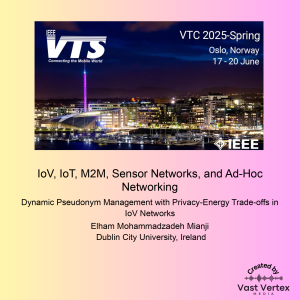

VTC 2025 Spring Conference’s Shorts
Dynamic Pseudonym Management with Privacy-Energy Trade-offs in IoV Networks
2025-06-13
The Internet of Vehicles (IoV) represents a significant advancement in intelligent transportation systems (ITS), enabling real-time data exchange between vehicles and infrastructure to enhance road safety, traffic efficiency, and user experiences. Vehicular edge computing (VEC) has emerged as a critical enabler, offering localized data processing and facilitating data trading among vehicles and edge servers. While data trading enhances system efficiency by enabling seamless information exchange...
The Internet of Vehicles (IoV) represents a significant advancement in intelligent transportation systems (ITS), enabling real-time data exchange between vehicles and infrastructure to enhance road safety, traffic efficiency, and user experiences. Vehicular edge computing (VEC) has emerged as a critical enabler, offering localized data processing and facilitating data trading among vehicles and edge servers. While data trading enhances system efficiency by enabling seamless information exchange among vehicles and infrastructure, it also introduces significant challenges in preserving user privacy, protecting against malicious tracking, and managing energy consumption effectively. To tackle these challenges, we propose a novel Energy-Efficient Pseudonym Management with Dueling Deep Q-Network (E2PM-DDQN) framework for VEC-enabled IoV, aiming to enhance the balance between privacy protection and energy efficiency during data trading. By deploying an RL agent at VEC servers, our approach dynamically manages pseudonym updates during data trading, improving the trade-off between privacy and energy consumption. Simulation results in a VEC-enabled IoV environment confirm that our proposed E2PM-DDQN framework achieves higher privacy entropy than state-of-the-art approach, enables higher rewards than baseline strategies, and ensures lower energy consumption. These results highlight how a reinforcement learning (RL) approach outperforms non-RL methods.
Dynamic Pseudonym Management with Privacy-Energy Trade-offs in IoV Networks
Elham Mohammadzadeh Mianji, Gabriel-Miro Muntean, Irina Tal, Dublin City University
View more
Dynamic Pseudonym Management with Privacy-Energy Trade-offs in IoV Networks
Elham Mohammadzadeh Mianji, Gabriel-Miro Muntean, Irina Tal, Dublin City University
Comments (3)


